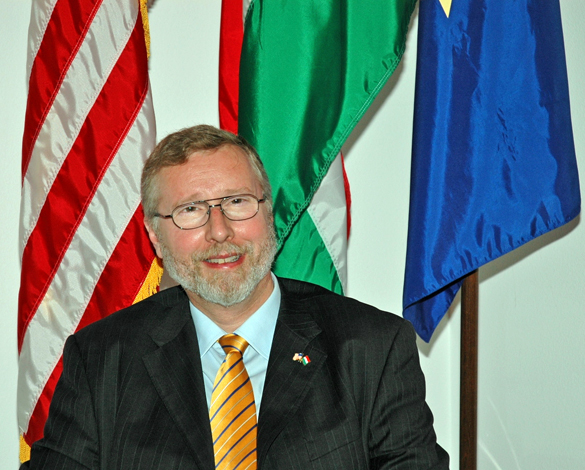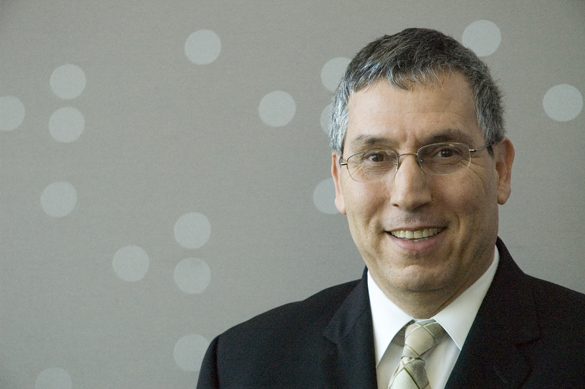Hungary has given the world more than Zsa Zsa and Eva Gabor, the Rubik’s Cube, Béla Bartók, and the Pulitzer Prize; it has made considerable contributions that helped to change the world.
Ambassador Balázs Bokor, consul general of the Republic of Hungary in Los Angeles, will visit California State University, Dominguez Hills to discuss Hungary’s relationship with the United States, and the world, on Wednesday, March 16, from 1 to 3 p.m. in the Loker Student Union, Ballroom C. The event is free and open to the public.

Referencing Hungary’s January 1, 2011, acquisition of the European Union (EU) presidency, Ambassador Bokor’s discussion topic will be “Hungary and the U.S. from a European Union Presidency Point of View.” The EU, a partnership of all 27 democratic European countries, works to improve economic and political conditions throughout Europe.
“The EU is headed by European countries on a rotating basis. The country that holds the presidency oversees EU operations, but it is not making decisions. It chairs events and prepares the subjects about, and how, to make decisions, but doesn’t actually make the decisions,” Bokor said.
Dr. Hamoud Salhi, assistant professor in the department of political science, said the EU presidency isn’t the decision making body, not only because that function rotates every six months, but because the EU is comprised of several committees that take on those duties.
“The European Commission is the permanent committee that [functions] on a day-to-day basis. It implement policies, evaluates taxes, and [manages] its membership,” Salhi said.
The European Commission reports that the priorities of the Hungarian-led EU include the EU expansion process and the stabilization of the European economy.
Hungary was one of the first countries to be affected by the global economic crisis in 2008, but has been striving to create a system that provides opportunities for prosperity, according to Salhi.
“Before 1989 Hungary was under communism – state control. After Hungary was freed from communism, it adopted a very liberal, pro-capitalist approach. Capitalism can be damaging, because it can increase social gaps between rich and poor. The happy medium for Hungary, along with the rest of Europe, has been to pursue neo-liberal policies, similar to the food stamp and affirmative action programs in the U.S., which are designed to help the poor, and also to help society – to sell goods,” Salhi said. “The neo-liberal policies take into account social welfare issues, at the same time, opening opportunities for the private sector to flourish.”

Of the lecture, Salhi said, “This would be an excellent opportunity for the students to hear from someone who is a practitioner – who has lived the communist experience – who has seen a transition to a liberal capitalist system, and whose country is going through some kind of challenges as a result of world-wide economic crisis.”
Taking an interest in young people, Bokor has spoken at several universities in Europe and the Middle East, and at numerous campuses in the U.S.
“Young people may not realize the great changes in the world. In the late 80s, there was not so much freedom. You couldn’t go wherever you wanted in Europe. Now you can travel with one single visa throughout all of Europe,” Bokor said.
Prior to being appointed consul general of Hungary in Los Angeles in 2007, Bokor served as ministry of foreign affairs/chief of state protocol. He has served as ambassador extraordinary and plenipotentiary of Hungary in Beirut, Lebanon; Nicosia, Cyprus; Damascus, Syria; and Amman, Jordan. Among many other appointments he has also served as ministry of foreign affairs/director general for the Department of the Middle East and Africa; and as second secretary and consul in the Embassy of Hungary in Tripoli, Libya.
“I have a personal interest in learning about Ambassador Bokor’s experience in the Middle East, and how he would interpret the recent changes in countries he’s so familiar with, including Tunisia, Lybia, and Egypt.” Salhi said.
Political science, cultural diversity, Middle Eastern and African issues, humanitarian matters, human rights, and food security and development are among Bokor’s interests. He speaks Hungarian, Arabic, English, Russian, French, and Hebrew.
The lecture by Ambassador Balázs Bokor is sponsored by the CSU Dominguez Hills College of Arts and Humanities. For more information and to RSVP, email lperdew@csudh.edu or call (310) 243-3389.
For more information about the College of Arts and Humanities, visit, or call (310) 243-3389.